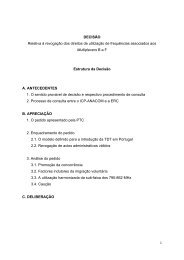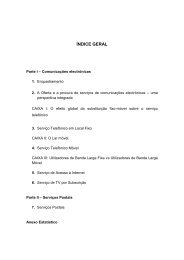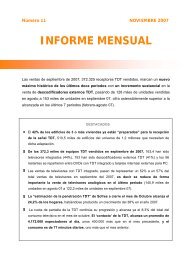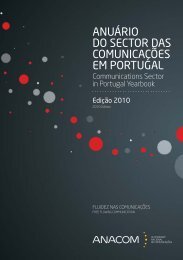The Price of Plurality - Stakeholders - Ofcom
The Price of Plurality - Stakeholders - Ofcom
The Price of Plurality - Stakeholders - Ofcom
You also want an ePaper? Increase the reach of your titles
YUMPU automatically turns print PDFs into web optimized ePapers that Google loves.
26Robin Fosterprogramme cost infl ation, which the commercial PSBs and the BBChave been able to pass on to advertisers in the form <strong>of</strong> higher air-timerates, and to licence payers in the form <strong>of</strong> higher fees.Overlaid across these specifi c outcomes, it is argued that the UK PSBecology more generally has supported high-quality programming,helped by a balanced mix <strong>of</strong> funding, organisational and operationalmodels. <strong>The</strong> BBC has set high standards across the market and thecommercial PSBs have responded to audience expectations byinvesting more in a range and diversity <strong>of</strong> UK programming thanthey otherwise would have done. In turn, the BBC has benefi tedfrom exposure to new ideas and approaches in the commercialsector. <strong>The</strong>re has been no direct competition for funding, at leastbetween the BBC and ITV, hence avoiding the worst type <strong>of</strong> ratingschasingcommissioning and scheduling that might have emergedin a system based only on advertising revenues. Pr<strong>of</strong>essionals in theUK broadcasting system have shared a common set <strong>of</strong> ‘PSB’ values,and their career incentives – based on movement across the sector– have ensured that those values have been embedded in what theydo, whether in the public or commercial sector.Most observers are agreed that this system has worked well onbehalf <strong>of</strong> the public as both consumers and citizens, even if at timesit might have been accused <strong>of</strong> ineffi ciency, complacency and arather inward-looking cultural consensus. Indeed, several shocks tothe system as it evolved worked to improve delivery <strong>of</strong> the ‘plurality’outcomes outlined above. For example, the introduction <strong>of</strong> theindependent production quota in the 1990 Broadcasting Act openedup a hitherto closed part <strong>of</strong> the broadcasting value chain, as theBBC and ITV were forced to commission programmes from externalsuppliers. <strong>The</strong> emergence <strong>of</strong> fi rst Channel 4 and then BSkyB alsoinjected new ideas and approaches into the system, challengedconventional thinking about how programmes should be made andserved new audiences more effectively.Looking ahead to a fully digital and largely broadband world,however, we are entering a very different marketplace. Instead <strong>of</strong>a relatively closed fi ve-channel system, we are already well into themulti-channel world, poised at the start <strong>of</strong> a broadband and ondemandrevolution. In this new world, to what extent are the aims andoutcomes <strong>of</strong> plurality <strong>of</strong> PSB provision still relevant? If they are, will theburgeoning market provide those outcomes automatically or do westill need intervention? Is it enough to have a multiplicity <strong>of</strong> sources <strong>of</strong>any types <strong>of</strong> content, or do we need multiple suppliers <strong>of</strong> UK-madePSB-type content? In particular, do we need to sustain publicly fundedPSB provision outside <strong>of</strong> the BBC?In the following sections, these questions are examined in moredetail. My conclusion is that in this radically different marketplace,public intervention to guarantee plurality <strong>of</strong> PSB provision outside<strong>of</strong> the BBC becomes less relevant than it has been to date. In theold limited-channel managed ecology, plurality mattered preciselybecause there was so little <strong>of</strong> it. Everyone watched PSB content – thepriority was to make sure there was some diversity <strong>of</strong> supply. In the







